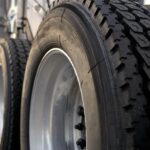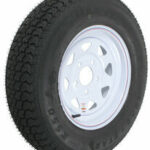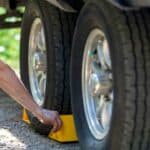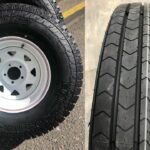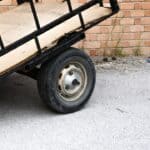Trailer tires are under a lot of stress. They carry heavy loads and often travel at high speeds. That’s why trailer tire pressures are so high.
The average car tire is inflated to about 30 psi, but the average trailer tire is inflated to 50-60 psi. That extra pressure helps the tires carry the heavy load of the trailer and resist heat build-up from extended use.
If you’ve ever wondered why your trailer tires seem to have higher pressure than other types of tires, there’s a good reason for it. Trailer tire pressures are typically much higher than passenger or light truck tires because they need to be able to carry a heavier load. Tires are designed to support a certain amount of weight, and when that weight is exceeded, the tire can start to deform.
This can lead to flats or blowouts, which aren’t ideal when you’re out on the open road. Having higher pressure in the tires helps reduce the chance of this happening. Of course, there is such a thing as too much pressure.
If the pressure is too high, it can cause the tire to bounce around on the pavement, which again isn’t ideal. You’ll want to consult your trailer’s owner manual or the tire manufacturer to find out what the proper inflation level should be for your particular setup.
Why are Trailer Tire Pressures So High?
What Psi Should a Trailer Tire Be?
A trailer tire should be inflated to 80 psi.
Should Trailer Tires Be Inflated to Max Psi?
Most trailer tires should be inflated to the maximum psi rating. This can be found on the sidewall of the tire. Inflating your trailer tires to the max psi will give you the best load capacity and performance from your tires.
It is important to check your trailer tire pressure regularly, as over or under-inflated tires can cause problems while driving. If you are unsure about what pressure to inflate your trailer tires too, consult a professional or the manufacturer of your trailer tires.
Is 90 Psi Too High for Trailer Tires?
No, 90 psi is not too high for trailer tires. It is the recommended tire pressure for most trailers. Tire pressure is one of the most important factors in ensuring a safe and comfortable ride.
Too much or too little tire pressure can cause problems such as premature wear, poor handling, and an increased risk of a blowout.
Should I Over-Inflate My Tires When Towing a Trailer?
Overinflating your tires when towing a trailer is not recommended. This can cause the tire to overheat and potentially fail. It is important to maintain the correct tire pressure for both the vehicle and the trailer.
What Psi Should My Trailer Tires Be at
When it comes to psi for your trailer tires, there are a few things to keep in mind. First, the weight of your trailer will impact how much psi is needed. Second, the type of terrain you’ll be driving on will also play a role.
Here’s a quick breakdown of what you should keep in mind when determining the psi for your trailer tires: The Weight of Your Trailer: The heavier your trailer, the higher the psi needs to be. This is because a heavier load puts more pressure on the tire, which can cause it to fail if the psi is too low.
For example, if you have a lightweight travel trailer, you’ll likely need less than 30 psi in each tire. However, if you have a heavy-duty fifth-wheel trailer, you may need upwards of 80 psi in each tire. The Type of Terrain You’ll Be Driving On: If you’re only going to be driving on paved roads, you won’t need as much psi as someone who plans to take their trailer off-roading.
That’s because rough terrain can put extra strain on tires, so they need to be inflated accordingly. For example, someone who only drives on pavement may only need 40-50 psi in each tire while someone who frequently goes off-roading may need 60-70 psi or more. As always, it’s best to consult your owner’s manual or the manufacturer of your trailer tires for specific guidance on what PSI is best for your particular setup.
12 Inch Trailer Tire Pressure
The average 12-inch trailer tire pressure is 50-60 PSI. However, it is always best to check the owner’s manual or the tire placard on the trailer for the recommended tire pressure. Overinflation of trailer tires is a common cause of premature tire failure.
When a tire is over-inflated, the center tread area wears out first. This leaves the outer edges of the tread more vulnerable to punctures and other damage. Underinflation of trailer tires is also detrimental to their lifespan.
Under-inflated tires can overheat and fail, especially at high speeds. They are also more likely to develop flats and blowouts. It is important to check your trailer’s tire pressure regularly, before every trip if possible.
This will help ensure that your tires are performing at their best and will help avoid costly repairs or replacements down the road.
Empty Utility Trailer Tire Pressure
If you own a utility trailer, it’s important to check the tire pressure regularly. An empty utility trailer can have different tire pressure requirements than a loaded one, so it’s important to know what those are.
The first thing you need to do is consult your trailer’s owner’s manual.
This will give you the specific tire pressure requirements for your trailer. If you don’t have the manual, you can usually find this information online or by contacting the manufacturer.
Once you know the correct tire pressure for your empty utility trailer, use a reliable gauge to check the pressure of each tire.
If any of them are low, add air until they reach the proper level. It’s best to check the tires when they’re cold, so if possible, do it first thing in the morning before you’ve driven anywhere.
Making sure your utility trailer tires are properly inflated is essential for safety and performance.
With just a little bit of care and attention, you can keep yours in good condition and avoid costly repairs down the road.
Trailer Tire Pressure Calculator
If you frequently tow a trailer, you know how important it is to keep your tire pressure at the proper level. Too much or too little pressure can lead to problems on the road. That’s why it’s important to have a reliable trailer tire pressure calculator on hand.
Several different factors go into calculating the perfect tire pressure for your trailer. The first is the weight of your trailer. This will determine how much air needs to be in the tires to support the load.
Next, you’ll need to consider the type of terrain you’ll be traveling on. If you’re going to be doing a lot of driving on rough roads, you’ll need higher tire pressures than if you’re mostly sticking to highways and interstates. Finally, temperature plays a role in tire pressure as well.
Cold weather can cause tires to lose some air, while hot weather can cause them to expand and increase in pressure. Keep an eye on the temperature and adjust your pressures accordingly. By following these tips and using a reliable calculator, you can make sure that your trailer tires are always at their optimal pressure levels.
This will help keep you safe on the road and avoid any costly accidents or breakdowns.
Jayco Trailer Tire Pressure
As the weather gets colder, you’ll want to make sure your Jayco trailer tires are properly inflated. Here’s a quick guide on how to do so:
First, find the recommended tire pressure for your particular model of Jayco trailer.
You can usually find this information in the owner’s manual. Once you know the ideal pressure, use a tire gauge to check the pressure of each tire.
If any of the tires are low, use a portable air compressor to add air until they reach the proper pressure.
It’s important not to over-inflate the tires, so don’t go above the recommended amount.
Once all of the tires are properly inflated, give them a visual inspection to look for any signs of damage or wear. If everything looks good, you’re ready to hit the road!
Boat Trailer Tire Pressure
A boat trailer is a vital part of owning a boat. It allows you to transport your vessel from one body of water to another with ease. However, for your trailer to work properly, the tires must be inflated to the proper pressure.
Underinflated tires can lead to several problems. They can cause the trailer to sway back and forth, making it difficult to control. They also increase the risk of a blowout, which could damage your boat or even put you in danger.
Overinflated tires, on the other hand, can make steering more difficult and cause premature wear on the tires themselves. They can also make it harder for the trailer brakes to do their job effectively. The ideal tire pressure for a boat trailer depends on the weight of the load being transported.
A good rule of thumb is to inflate the tires to 50% above the maximum load rating listed on the sidewall of the tire. For example, if your tire has a max load rating of 1,200 lbs., you would inflate it to 1,800 lbs.
per square inch (psi). If you’re unsure about what psi you should be inflating your tires to, consult with your local tire dealer or an experienced boater for guidance. With proper care and maintenance, your boat trailer will provide years of trouble-free service!
Conclusion
If you’ve ever wondered why your trailer tires are rated for such high pressure, this article is for you. Trailer tires are designed to carry a heavy load at high speeds, so they need to be able to withstand a lot of force. The higher the tire pressure, the harder it is for the tire to deform under load, which means it can carry more weight.
